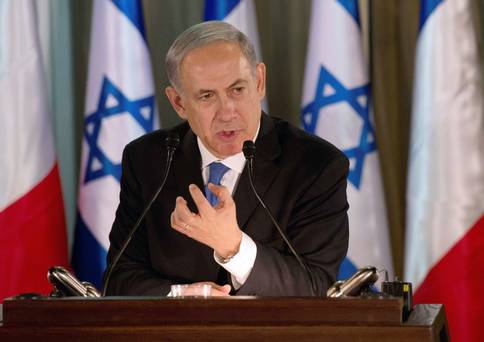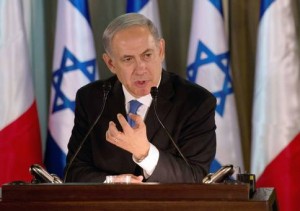
Netanyahu condemns Iran nuclear deal as ‘historic mistake’
By Harriet Sherwood
Israel swiftly condemned the deal struck in Geneva, with the prime minister, Binyamin Netanyahu, calling it a “historic mistake” and warning that his country would not allow Iran to develop nuclear weapons.

Speaking to ministers at the weekly cabinet meeting on Sunday, Netanyahu said: “Today the world has become a much more dangerous place because the most dangerous regime in the world has taken a significant step toward attaining the most dangerous weapon in the world … Israel is not bound by this agreement.
“The Iranian regime is committed to the destruction of Israel and Israel has the right and the obligation to defend itself, by itself, against any threat. As prime minister of Israel, I would like to make it clear: Israel will not allow Iran to develop a military nuclear capability.”
Netanyahu, who has staked his premiership on the need to defend Israel against the Iranian threat by military action if necessary, faces further isolation from key allies in the west who brokered and endorsed the diplomatic accord with Tehran. The issue has severely strained relations between Israel and the U.S. over recent weeks.
But the prospect of diplomatic alienation did not stop a string of ministers taking to the airwaves to denounce the deal. “If in another five or six years a nuclear suitcase explodes in New York or Madrid, it will be because of the agreement that was signed this morning,” the economy minister, Naftali Bennett, said. “We woke up this morning to a reality in which a bad, a very bad agreement was signed in Geneva.”
The foreign minister, Avigdor Lieberman, said Israel needed to reassess its position in the light of the deal. He said: “A situation assessment is needed. Apparently, we are going to have to make decisions, when all the options are on the table.”
He added: “Obviously when you look at the smiles of the Iranians over there in Geneva, you realize that this is the Iranians’ greatest victory, maybe since the Khomeini revolution, and it doesn’t really change the situation within Iran.”
But some analysts suggested that Israel’s options were limited by the west’s consensus on the need for a diplomatic solution to the Iranian nuclear threat.
“International legitimacy for a unilateral Israeli attack is reduced significantly. The international community endorses this deal, and so Israel will find it really hard to use military power,” said Yoel Guzansky, former head of the Iran desk in the prime minister’s office and now a research fellow at the Institute for National Security Studies in Tel Aviv. The deal, he said, was “not perfect, not the deal we prayed for, but it’s not as bad as some as saying this morning”.
The justice minister, Tzipi Livni, suggested Israel needed to repair its relations with the US and seek tactical alliances elsewhere on Iran.
“After the signing of this agreement, Israel has to look ahead: to act in close co-operation with the United States, to strengthen that strategic alliance, and to create a political front with other countries as well, such as Arab countries that see a nuclear Iran as a threat,” she said
But the prospects of an alliance between Israel and the Gulf states should not be exaggerated, said Guzansky. “The Gulf states don’t like this agreement, but not necessarily for the same reasons [as Israel]. The fact is, Iran will be less isolated – this threatens the Gulf states. So there is a place for co-operation. But any suggestion that Israel could look for other allies is not serious. Israel now needs to repair the damage [with the US],” he said.
Meir Javedanfar, an Iranian-born Israeli analyst, stressed the agreement was interim, but “as an interim deal, it’s a good deal. It halts the more sensitive parts of Iran’s nuclear program. But we have to see what kind of final deal is reached.”
He added: “The sanctions relief element of the deal is so small it’s almost symbolic. Iran needs far more than that, so it will take the deal seriously and come back to the negotiating table in six months. This is a promising initial step, but there are many challenges ahead.”
(From the British newspaper The Guardian)

